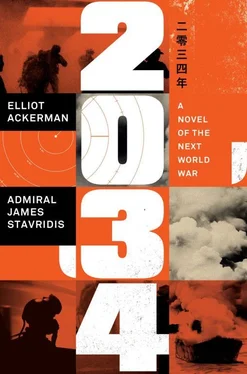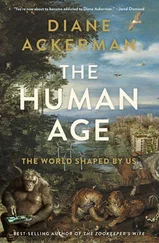The planes ascended and flew back the way they came.
The ship’s bridge remained silent.
Then there was a crackle of static. For the first time in more than a day, one of their radios turned on.

12:06 March 13, 2034 (GMT+8)
Beijing
The video teleconference shut off. The screen withdrew into the ceiling. Lin Bao and Minister Chiang sat alone at the vast conference table.
“Do you think your friend Admiral Ma Qiang is upset with me?”
The question took Lin Bao off guard. He never imagined that someone in Minister Chiang’s position would concern himself with the emotional state of a subordinate. Not knowing how to answer, Lin Bao pretended that he hadn’t heard, which caused Minister Chiang to ruminate a bit about why he’d asked.
“Ma Qiang is an excellent commander, decisive, efficient, even cruel. But his effectiveness can also be his weakness. He is an attack dog only. Like so many military officers, he doesn’t understand nuance. By sparing the John Paul Jones , he believes that I’ve denied him a prize. However, he doesn’t understand the true purpose of his mission.” Minister Chiang arched an eyebrow. What the true purpose of that mission was hung in the air as an unanswered question, one that Lin Bao wouldn’t dare ask aloud but instead asked through his silence, so that Minister Chiang continued, “Tell me, Lin Bao, you studied in the West. You must’ve learned the story of Aristodemus.”
Lin Bao nodded. He knew the story of Aristodemus, that famous Spartan who was the sole survivor of the Battle of Thermopylae. He’d learned it at the Kennedy School, in a seminar pompously titled “The History of War ” taught by a Hellenophile professor. The story went that in the days before the final stand of the famous Three Hundred, Aristodemus was stricken with an eye infection. The Spartan king, Leonidas, having no use for a blind soldier, sent Aristodemus home before the Persians slaughtered what was left of his army.
“Aristodemus,” said Lin Bao, “was the only Spartan who survived to tell the story.”
Minister Chiang leaned back in his armchair. “This is what Ma Qiang doesn’t understand,” he said, showing his teeth in an amused half smile. “He wasn’t sent to sink three American warships; that was not his mission. His mission was to send a message. If the entire flotilla was destroyed, if it disappeared, the message would be lost. Who would deliver it? Who would tell the story of what happened? But by sparing a few survivors, by showing some restraint, we will be able to send our message more clearly. The point here is not to start a needless war but to get the Americans to finally listen to us, to respect the sovereignty of our waters.”
Minister Chiang then complimented Lin Bao on his effectiveness as the American attaché, noting how well he’d managed the baiting of the John Paul Jones with the Wén Rui , and how American culpability in the seizure of that intelligence vessel disguised as a fishing trawler would undermine the international outcry that was certain to begin at the United Nations and then trickle from that ineffectual international organization to others that were equally ineffectual. Then, being in a pensive mood, Minister Chiang held forth on his vision of events as they might unfold in the coming days. He imagined the surviving crew members of the John Paul Jones recounting how they had been spared by the Zheng He . He imagined the Politburo Standing Committee brokering a deal with their Iranian allies to release the downed F-35 and its pilot as a means of placating the Americans. And lastly, he imagined their own country and its navy possessing unfettered control of the South China Sea, a goal generations in the making.
By the time he’d finished his explication, Minister Chiang seemed in an expansive mood. He placed his hand on Lin Bao’s wrist. “As for you,” he began, “our nation owes you a great debt. I imagine you’d like to spend some time with your family, but we also need to see to your next posting. Where would you like to be assigned?”
Lin Bao sat up in his chair. He looked the minister in the eye, knowing that such an opportunity might never again present itself. “Command at sea, Comrade Minister. That’s my request.”
“Very well,” answered Minister Chiang. He gave a slight backhanded wave as he stood, as if with this gesture alone he had already granted such a wish.
Then as Minister Chiang headed for the door, Lin Bao plucked up his courage and added one caveat, “Specifically, Comrade Minister, I request command of the Zheng He Carrier Battle Group.”
Minister Chiang stopped. He turned over his shoulder. “You would take Ma Qiang’s command from him?” Then he began to laugh. “Maybe I was wrong about you. Perhaps you are the cruel one…. We’ll see what can be arranged. And please, take those damn M&M’s with you.”

16:07 March 22, 2034 (GMT-4)
Washington, D.C.
For ten days Sandeep Chowdhury had slept on the floor of his office. His mother watched his daughter. His ex-wife didn’t harass him with a single email or text message even after internet and cellular service resumed. His personal life remained mercifully quiet. He could attribute this détente to the crisis consuming the country’s attention and his family’s knowledge that he was playing a central part in its management. On the political left and political right, old adversaries seemed willing to dispense with decades of antipathy in the face of this new aggression. It had taken the television networks and newspapers about a day, maybe two, to understand the magnitude of what had occurred in the South China Sea and over the skies of Iran:
A flotilla wiped out.
A downed pilot.
The result was public unity. But also, a public outcry.
This outcry had grown louder and louder, to the point where it had become deafening. On the morning talk shows, on the evening news, the message was clear: We have to do something . Inside the administration a vociferous group of officials led by National Security Advisor Trent Wisecarver subscribed to the wisdom of the masses, believing that the US military must demonstrate to the world its unquestioned supremacy. “When tested, we must act” was the refrain echoed by this camp in various corners of the White House, except for one specific corner, the most important one, which was the Oval Office. The president had her doubts. Her camp, of which Chowdhury counted himself a member, had no refrain that they articulated within the administration, or on television, or in print. Their doubts manifested in a general reluctance to escalate a situation that seemed to have already spun out of control. The president and her allies were, put simply, dragging their feet.
Ten days into this crisis, the strategy of de-escalation seemed to be failing. Like the sinking of the Lusitania in the First World War, or the cries of “Remember the Maine !” at the outbreak of the Spanish-American War, a new set of names had replaced these historical ones. Within days, every American knew about the sinking of the Carl Levin and the Chung-Hoon , as well as the survival of the John Paul Jones , which hadn’t really survived but had been scuttled by the submarine that had rescued its few dozen remaining crew members, to include the commodore of the flotilla, whom the Navy had kept out of the limelight as she faced a board of inquiry.
If Sarah Hunt had, at least up to this point, managed to remain relatively anonymous, the opposite held true for Marine Major Chris “Wedge” Mitchell. After the Battle of Mischief Reef, as the media dubbed the one-sided engagement, senior Chinese officials reached out to the administration. Minister of Defense Chiang was particularly engaged, insisting that this crisis was one large misunderstanding. As a gesture of goodwill, he offered himself to the Americans as an intermediary between them and the Iranians. He would personally negotiate the return of the F-35 and the release of its pilot. When a delegation of Chinese emissaries arrived with this message at the US embassy in New Delhi—their own embassy in Washington having been shut down in the wake of the crisis—the administration replied that it was the height of dishonesty to pretend that the F-35 would be turned over before the pilfering of its many sensitive technological secrets by the Chinese and Iranians. As for the pilot, the administration was under an intense amount of pressure to recover him.
Читать дальше













